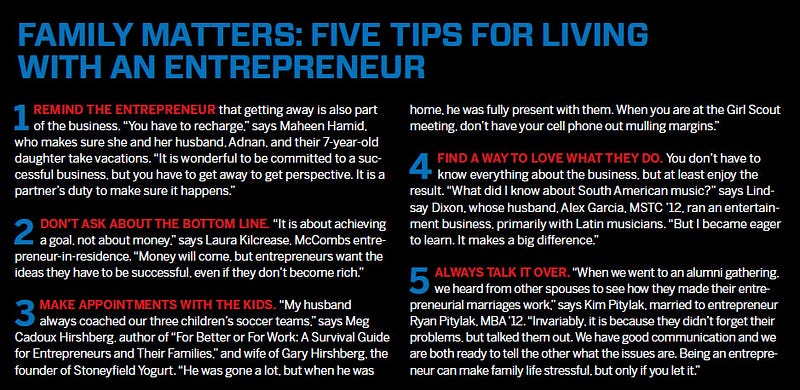How to Manage Life When an Entrepreneur’s Work is so Much More Than a Job
Venture rounds. Vision statements. Market validation. Customer service. Conference calls. Client demands. Not to mention date night, soccer practice, and the PTA.

By Robert Strauss
Explorer Hernando Cortez was already a wealthy and powerful man when he set sail from Cuba with nine ships, on a mission to the New World for glory, gold, and the Gospel in 1518. Despite his short, thin stature, the Spaniard cut an impressive figure, draped in a black velvet cloak with gold tassels and a feathered hat, a self-described “gentlemanly pirate.”
As the legend goes, upon arrival in Mexico Cortez burned the ships on the beach to demonstrate to his men that this was an expedition of total commitment — no escape route, no voyage home.
It turns out the legend isn’t entirely true (Cortez had the ships scuttled, not burned, and it was likely a political move to avoid mutiny), but Alex Garcia likes to think of the story as an example of what’s required to launch a new business.
“Being an entrepreneur is being that way,” says Garcia, MSTC ’12 and a lifelong entrepreneur. “The boat brought you here and now you have to burn it. You have to have faith, and you have to have someone by your side who has that same faith.”
According to U.S. Census figures America boasts some 27 million small businesses. Each one of them has at least one entrepreneur who may not exactly burn boats but who can be eccentric, obsessed, or sometimes oblivious to others — behavior perhaps only a spouse can understand or appreciate.
“When you are in a relationship of equals, which is ideally what a marriage is, or at least is supposed to be, then you are used to talking things through. There is nuance.”
– Meg Cadoux Hirshberg, a columnist for Inc. magazine and the author of “For Better or For Work: A Survival Guide for Entrepreneurs and Their Families.”
“But in a business, things are moving quickly, and there is often not time for explanations. That is something a family has to get used to with an entrepreneur,” Hirshberg adds. “That is a big difference when a person is involved with his or her business all the time.”

Managing the Quirks
Kim and Ryan Pitylak, MBA ’12, started dating as juniors in high school in Michigan. Fourteen years later, Kim reflects that she is grateful that she recognized Ryan’s drive to be entrepreneurial early on.
“He always wanted to be in business for himself, and I realized even back then that there would be a different kind of time commitment,” Kim says. Ryan is now partners with a McCombs classmate, Chantal Pittman, in a social marketing consulting firm, Unique Influence, Inc.
“You just have to be flexible in your schedule when you take up with an entrepreneur,” Kim says. “You can’t expect to have dinner on the table at 6 every night. But you can, if you do things right, have a valuable and exciting relationship. The dreams are somehow bigger than if you had a ‘real job.’ ”
Sometimes those big dreams, and the work required to achieve them, supplant almost every other activity in an entrepreneur’s life. For Ryan, a tough sacrifice was ice hockey, his off-hours passion since growing up in Michigan. So Kim took it upon herself to come up with a substitute, and now they play together in a Thursday night kickball league in Austin. It’s a less intense pastime than chasing a puck, and it’s another chunk of carved-out time they can share.
“If he has to take a call during the game, it isn’t so crucial,” says Kim. “Plus, we are there together. And he is so obsessed with whatever he is into that he has become a great kickball player, too.”
Of course, sometimes that obsessive tendency moves in at home, too. When the Pitylaks first started living together, their small apartment was overgrown with technology.
“We had more wires than Best Buy, and Ryan was always on some keyboard, into the middle of the night,” she says. “Click-click-click-clack-clack, it would be all the time — so much so that when I would hear fingers on a keyboard, it would be like fingernails on a chalkboard.
“But I knew Ryan was accomplished in so many ways, and I just had to put that out of my mind. When we moved into a bigger place, I insisted on having our bed far away from any keyboard. I have always admired him, but I have to admit things are easier now.”
Role Playing
A 2011 Duke University study showed that 70 percent of entrepreneurs were married, and 60 percent of them had kids. An overwhelming plurality of them were first-borns, with all their bull-in-the-china-shop traits, but about half of them knew from childhood experience about their potential neuroses, since they came from entrepreneurial families.
For Kate and Jeremy Bencken entrepreneurship was baked in the genes. Kate’s father had his own public relations firm when she was growing up, while Jeremy’s father ran an air conditioning maintenance business.

“My mother (who is a school principal), on the other hand, thought I was nuts for getting into my own business,” says Jeremy, MBA ’03. “I guess she saw how hard it was for my dad to make time, but I think it is because she had a steady job that it all worked out.”
Going to college at Santa Clara University, right in the heart of Silicon Valley in the 1990s — the boomiest of boom times in the entrepreneurial tech world — the Benckens were like painters in 19th century Paris, poets and folksingers in 1960s Greenwich Village, or shortstops in the Dominican Republic.
“Entrepreneurs were all around us. Everyone had a startup, at least in their minds,” says Jeremy. The Benckens’ idea, though, came almost by chance. They had moved about 10 miles up U.S. 101 from Santa Clara, Calif., to Mountain View for their new jobs in 1999 but found it impossible to find a reasonably priced apartment in the midst of the boom. One day outside their cramped, expensive place, a woman looking for an apartment asked them what they thought of their landlords. The light bulb went off: the Benckens’ had the idea for ApartmentRatings.com, a better way to find apartments online through Trip-Advisor-like recommendations.
And thus launched their intrepid venture into the über-complicated world of living with an entrepreneur — in this case, each other.
“We were 24 and didn’t know better than to work constantly,” says Kate, MBA ’04. “I guess we never gave it a thought not to be mutually supportive at home, too.
“I think given our personalities — we are both kind of Type A, oldest children — we were used to being in the fray,” Kate says. “I won’t say there was no dividing line, but it was hard not to talk about the business all the time. We were excited about it. It definitely would have been harder if one of us was on the sidelines and watching.”
It was more that way, though, for Lindsay Dixon. She was a high-school teacher, the steadiest of jobs, when she met Alex Garcia, MSTC ’12, the lifelong entrepreneur with a fondness for Cortez’s no-turning-back approach. Garcia had a business setting up entertainment acts, working with clubs and musicians for just the right bookings and effects.
“We are total opposites professionally,” Dixon says. “I am a big rule follower, but he always wanted to work for himself.”
Indeed, like many of his fellow entrepreneurs, Garcia displayed a knack for business early on. When he was in elementary school, he made sandwiches at night and sold them to classmates for lunch the next day. He had a newspaper recycling business in middle school and a cheese-making business in high school. (You must be destined for entrepreneurship when you’re a 16-year-old spending Friday nights cranking out wheels of brie.)
“I have to admit, it was really attractive to me to be with someone so passionate about business,” says Dixon. “And it is essential to have that attraction when he comes home at 4 a.m. after a concert.”
McCombs 2012–13 entrepreneur-in-residence Laura Kilcrease, MBA ’92, says it often really does work out better for one spouse to be the entrepreneur and the other to be the supportive one. But, she warns, that does not mean that one is lesser and one is greater in the relationship — just that the entrepreneur needs a net under him or her, and perhaps the only one who can provide that is a spouse.
“My husband knows that I am thinking every waking minutes about some venture or another,” says Kilcrease. “But you really do have to make time for each other. Friday night is definitely date night. You turn off the cell phones for a while and enjoy one another. It is imperative for even an obsessed entrepreneur to have down time with a spouse. You found each other on down time, right?”
Maheen and Adnan Hamid, both MBA ’03, co-founders of Breker Verification Systems, were actually found for each other. Theirs was an arranged marriage, and she was still living in her native Bangladesh when Adnan, the son of a diplomat, started calling her from the United States and sharing his dreams of starting a business.
“He had been a verification engineer and he started talking about all this technology,” Maheen says. “I didn’t know the technology, but having been in an entrepreneurial family, I understood business. I knew I could help bring this to fruition. I could see what he needed from me even early on.”
“When you are starting a company, there is a lot that needs paying attention to,” Adnan says. “She knew business from her family and knew how to handle the bumps and the ups and the downs. And she knows when to tell me to stop. She makes sure we take our vacations. I could go all the time, but that would be counterproductive, too.”Adnan Hamid says it was a relief that Maheen was on board right away. Maheen, the company’s chief financial officer, handles most of the business functions of the company, while CEO Adnan is, essentially, the technical chieftain. Both acknowledge that their life works because Maheen is the tiller of the family ship.
Entertainment promoter Garcia says his first marriage burst because of his all-in entrepreneurial nature. Dixon, though, found it “sexy.”
“It was definitely not something I was used to, but the idea that he had lots of ideas was attractive,” she says. “It’s not that we had musicians coming to the house playing music at all hours of the night, but when your spouse is so enthusiastic at any hour of the day, that can make for an exciting relationship.”
Junior Partners
It also helps when your kids buy in. The Hamids say their 7-year-old daughter, Saira, is already caught up in the entrepreneurial world.
“She is a great marketing person,” says Maheen, admitting that her daughter may not know the intricacies of verification engineering technology yet. “She is in this entrepreneurial family and she will benefit by it. She is already independent, I think, because of it.
“At the age of 5, she came to me and said in all seriousness, ‘I need a job with Breker,’” says Maheen, noting that Saira’s drawings are all over their boardroom, since she is often there during meetings (child care can be “challenging” for the dual-entrepreneur family). “We all understand that having our own business means unpredictability and learning to go with the flow. All three of us have gotten pretty good at it.”
Children can be an inspiration to entrepreneurs, too. Robin Chase, the woman who created the $242 million car-sharing business Zipcar, told Fortune Magazine that she was about to give up on her dream before it started when her 12-year-old daughter said, “So does this mean you could become rich and could give more money to UNICEF and save lots of children’s lives? Do it.”
“You hope your children buy in, too,” says entrepreneur-in-residence Kilcrease. Still, she says, the most important thing is that the spouse is on board and can see the proverbial forest for the trees.
“Early on, the entire family will forego time with the entrepreneur. The spouse may have to take care of things in that classic situation, but the reward in the end will be the enthusiasm for life and, hopefully, financial rewards, too,” says Kilcrease, hoping not to sound too cynical. “You may miss a couple of dinners, but you will be driving that Ferrari and you will like that.”
Financial gain and automotive perks aside, the truth is that many entrepreneurs would make for grumpy living companions if not for the very work that makes their home life so unpredictable.
“Frankly, the entrepreneur would be miserable working the 9-to-5 job, so the spouse has to recognize that,” Kilcrease says. “You want an enthusiastic partner, and entrepreneurship really does make for an enthusiastic relationship.”
As long as you can live with it.
About this Post
Share:


